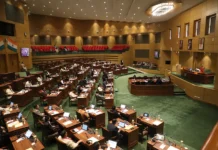[ Jimailu Yun ]
Arunachal Pradesh, renowned for its breathtaking landscape and rich cultural heritage, grapples with a distinctive challenge – the rise of literate unemployment.
Despite advancement in education, the state faces the paradox of an increasing number of educated individuals struggling to find suitable employment. This article delves into the complexities of literate unemployment in Arunachal, examining its cause, consequences and potential avenues for resolution.
Causes of literate unemployment
- Mismatched skillsets: The education system may not align with the evolving demands of the job markets, resulting in a gap between the skill acquired by graduates and those sought by employers.
- Limited diversification: A focus on traditional academic streams without corresponding emphasis on vocational training and diverse skill development can restrict employment option for graduates.
- Insufficient local industries: The lack of a robust industrial base within the state contributes to scarcity of suitable job opportunities for the educated workforce.
- Government employment dominance: A preference for government jobs, often perceived as being more secure, can lead to intense competition and limited opportunities in the public sector.
Consequences of literate unemployment
- Underutilisation of talent: The state faces underutilisation of its educated workforce, leading to a loss of human potential and creativity.
- Economic implication: Despite possessing a literate population, the economy may not experience the expected growth due to lack of skilled and employment work force.
- Social frustration: Graduates facing unemployment may experience frustration and disillusionment, impacting mental health and social dynamics.
Potential solution
- Diversification education programmes: Encouraging a broader range of academic and vocational programmes can equip students with skills relevant to emerging industries.
- Promoting entrepreneurship: Fostering an entrepreneurial spirit and providing support for startups can create alternative avenues for employment.
- Industry academia collaboration: Establishing partnership between educational institutional and industries can ensure that academic curricula align with industry requirement.
- Government support for private sector: Encouraging and supporting the growth of private sector can lead to increased job opportunities outside of government employment.
Addressing literate unemployment in Arunachal necessitates a comprehensive and collaborative effort by reevaluating education strategies, promoting entrepreneurship, and fostering collaboration between academia and industries.
The state can transform its educated population into a valuable asset, contributing to both personal fulfilment and economic prosperity. (The contributor is from the commerce department of Rajiv Gandhi University, Rono Hills, and may can reached at jimaiyun@gmail.com)


